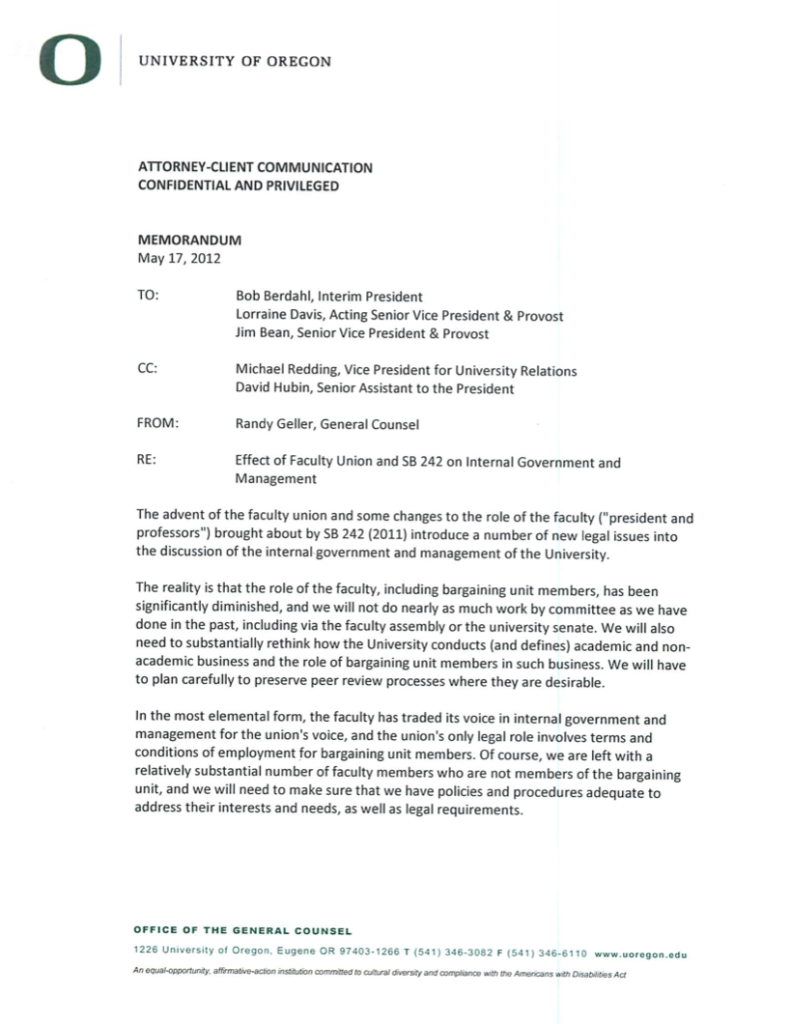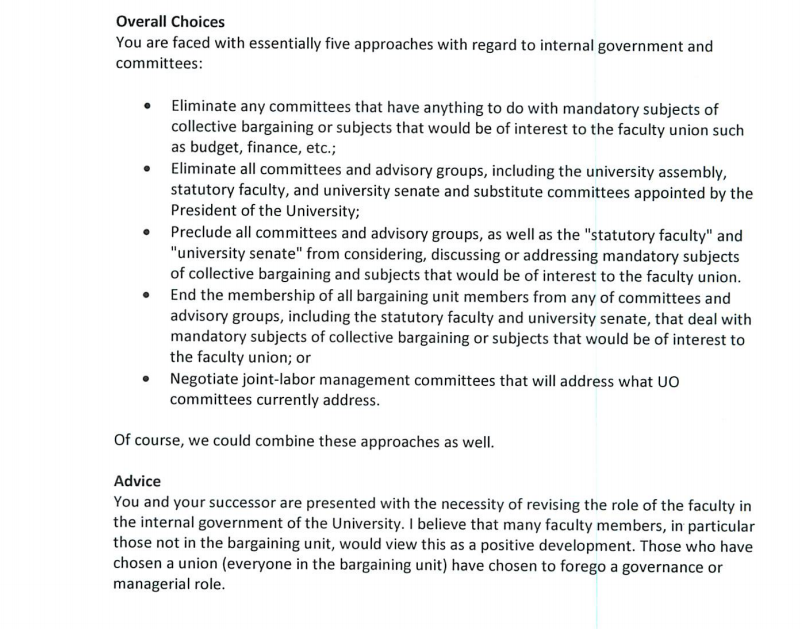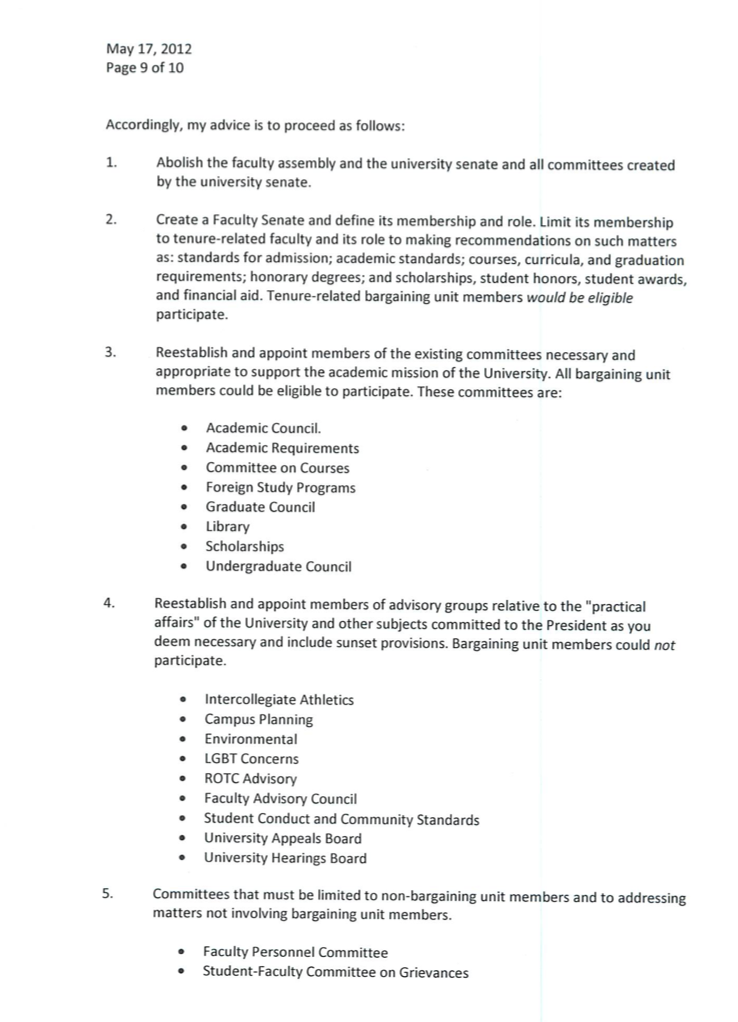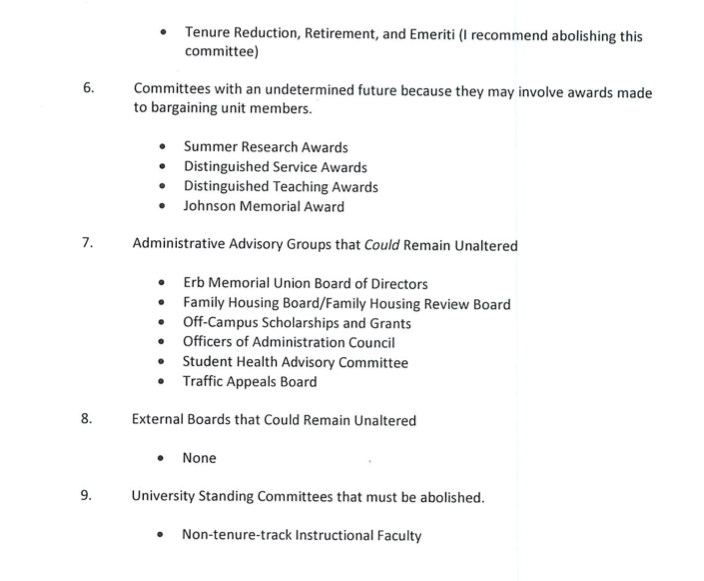Last updated on 12/14/2015
1/4/2015: The UO administration’s secret plan to abolish the UO Senate
UO Matters operatives have obtained a “confidential” memo from former UO General Counsel Randy Geller to former Interim President Bob Berdahl, recommending that Berdahl abolish the University Senate and prohibit most faculty members from being members of the Faculty Personnel Committee, Faculty Advisory Counsel, Student Conduct committee, the Intercollegiate Athletics Committee, etc.
Geller made this recommendation three weeks after the administration admitted defeat over the faculty union. The full memo is here. As you can see it advises:
1) abolition of the current UO Senate and all its committees;
2) creation of a new faculty-only Senate, limited to making recommendations to the administration;
3) membership on key committees to be restricted to non-bargaining unit faculty; and
4) other committees replaced by “administrative advisory groups” serving at the president’s pleasure.
Geller’s proposal seems insane, but key parts of it have already been implemented, and it seems the likely source for the statements Interim President Coltrane made at the December emergency Senate Exec meeting about the need for changes in faculty governance “given our new unionized environment”. Coltrane has kept the administrative advisory groups that Bob Berdahl and Mike Gottfredson set up to replace Senate committees, such as the President’s Advisory Group on Intercollegiate Athletics, the Budget Advisory Group, and the Public Records Administrative Advisory Group.
Coltrane has also been working with new UO AVP Chuck Triplett (the former OUS apparatchik who helped Pernsteiner fire Richard Lariviere) and new University Board Secretary Angela Wilhelms to set up a President-appointed Policy Advisory Committee, and revoke the faculty authority that has existed since the founding of the University of Oregon and which is a normal part of faculty governance at other universities.
In addition, last year BOT Chair Chuck Lillis went along with Geller and Berdahl’s plan to cut the Senate out of the Delegation of Authority debate, and tried to do the same again last month with Triplett and Coltrane’s plan to drop the Senate from the policy development and approval process.
You might ask why our university’s top lawyer would attempt to hide his legal opinions about faculty governance from the faculty – and why people like Dave Hubin would help him keep the secret. You might also ask why the our VPs for Academic Affairs, Doug Blandy and Barbara Altman, would try to hide their advice about grading in the event of a GTF strike from the faculty who assign grades. Maybe Scott Coltrane will have some answers at the next Senate meeting, Wednesday, Jan 14th.
1/13/2015 update: UO won’t share shared governance advice
We’ve had a series of attacks on shared governance over the last few years, led by Bob Berdahl and Mike Gottfredson, but unfortunately continuing under Scott Coltrane with the attempt to subvert the Policy on Policies and the UO Constitution.
So what sort of legal advice have our Johnson Hall colleagues been getting? They don’t want to tell us. I’ll go out on a limb and say Doug Park wrote this response to my public records request below. Not exactly trust inspiring.
The only way the faculty is going to learn about these attacks is from leaks of “confidential” documents to UO Matters. So keep them coming!
From: “Thornton, Lisa” <pubrec@uoregon.edu>
Date: January 13, 2015 at 5:02:57 PM PST
Subject: Public Records Request 2015-PRR-151
01/13/2015
Dear Mr. Harbaugh:
Given the broad scope of your request, we anticipate it would be necessary to sort through hundreds, if not thousands, of pages of documents to pull documents that are responsive to your request. In addition, you requested documents that you know are confidential because you specifically requested “legal advice.” Accordingly, your request is denied.
Thank you for contacting the University with your request.
Sincerely,
Lisa Thornton
Office of Public Records
University of Oregon
Office of the President
1/8/2015 update: Johnson Hall admins won’t talk about Geller / Berdahl memo
Camilla Mortenson has the story in the Eugene Weekly, here. It seems Coltrane, Park, and Hubin won’t talk about the memo or about the extent to which it continues to guide the thinking of Johnson Hall and the new Board of Trustees. Assistant UO PR Flack Julie Brown is the highest ranking person who will talk on the record – and even she won’t disavow this plan? Yikes. I’ll post additional docs as I get them.
1/7/2015 update:
In the Senate Exec meeting today Dave Hubin attempted to argue that the administration had rejected Geller’s proposals. When I left for a bathroom break Dave followed me out, asking what other documents I had about this proposal. I told him I wouldn’t tell him because it might reveal my source. Let’s just say the well isn’t dry. Hubin also suggested that I make a public records request if I wanted to learn more, so I have:
Subject: Documents from the UO GC’s office on legal advice regarding shared governance
Date: January 7, 2015 at 9:34:40 PM PST
Cc: David Hubin <hubin@uoregon.edu>, doug park <dougpark@uoregon.edu>, Scott Coltrane <coltrane@uoregon.edu> To: Lisa Thornton <pubrec@uoregon.edu>
Dear Ms Thornton –
This is a public records request for any documents from the UO General Counsel’s office (or outside attorneys) providing advice to the UO President dated from 1/1/2010 to the present, on topics involving:
1) The UO Senate and shared governance in general;
2) the Senate Intercollegiate Athletics Committee and the President’s Advisory Group on Intercollegiate Athletics;
3) the Senate Transparency Committee and the Public Records Administrative Advisory Group;
4) open meetings for the UO Senate, Senate committees, and Administrative Advisory Groups.
I am ccing current interim General Counsel Doug Park, as he should have access to the GC’s records and should be easily able to provide these documents, and Interim President Scott Coltrane for the same reason.
I’ve also cced presidential assistant Dave Hubin, as he suggested that I make this public records request at the Senate Executive Committee meeting today and recently told the STC that future PRAAG meetings would be closed, and may have copies of the advice on these matters.
I ask for a fee waiver on the basis of public interest.




Had enough. Can we please use the union power we’re purchasing with our dues much more aggressively this time around?
Administrators are in no way our colleagues, and they are in no way leading by example (nice raises CAS admins just offered each other). They have come dangerously close to leaving us with nothing to lose, no?
Unbelievable how the interim president can speak of trust breaking over contract negotiations with the GTFF while a secret (narrow, hostile, anti-faculty) plan was hatched and then successively implemented from the bowels of Johnson Hall? Amazing how only one set of choices is possible from the anti-faculty viewpoint of Geller: further erode faculty power. Can’t beat the union, then kill the senate and couch it in questionable and one-sided legalese. The anti-faculty, anti-union sentiment is palpable on every page. If administrators do not know how to build trust in their leadership, then at least try to cultivate some creativity in making an institution work without defaulting to autocratic and secretive plans!
I tend toward Old Man’s view below. No sensible admin would take the memo seriously, and it is time to wash all the surfaces Geller touched down with bleach and set the table for a more collaborative future. where’s the hope for a cynic? Neither our interim president nor our interim provost were in Johnson all at the time and are not even listed as recipients. A clear renunciation of the memo would be a start, but only a start.
Sensible being the important qualifier. And as it happens the search for a new GC started this morning. So maybe Coltrane and Bronet are sensible.
Despicable.
Typical.
What a viper
It’s April 1st and I just haven’t noticed, right? Or is this from our friends at the Jade? It’s just so … comically blatant.
If they mean to have a war, let it begin here.
Nah, let’s keep this dispute peaceful.
The admins have gone completely bonkers! This document provides clear evidence of just how anti-faculty the administration has become–much more than I would ever have imagined even in my worst nightmares. Thank goodness for the Union!
Please use a screen name.
This Old Man likes to think that we are witness only to Randy Geller’s wet dream, and that no sensible Administration at any level would try to execute it. But, as J Parker says, If they mean to have war, let it begin here.
I thought Old Man was a pacifist? Or is it as Melville said:
“They are fighting Quakers; they are Quakers with a vengeance.”
I personally interpret this completely differently.
By giving themselves big raises, the admins are perfectly setting us up to ask for big raises to address the long-standing external equity issues particularly for associate and full professors.
This is perfect ammunition to negotiate with. They could have waited until after the contract was done but they did it already!
This is a gift. They’re tiring their own hands to give us raises.
This document is a privileged attorney-client communication that is clearly exempt from disclosure under ORS 192. I want to know how you got it and why you have made it public.
Please use a screen name.
A free press does things like that when it serves the public interest.
He could tell you, but then he’d have to kill you.
You are wrong. Simply having an in-house counsel as an author or party to a memo does not make it privileged, a fact that was recently reaffirmed by the court of appeals for the federal circuit in In re Google Inc. Rather, the test is one of *subject matter*–and other than the title of this I don’t see how any of it is legal subject matter. Randy Geller seemed to like to cloak his personal goals as “legal analysis” but when that analysis fails to pass even the most rudimentary standards of legal argument…
But that doesn’t matter: attorney client privledge is a “privledge” in legal proceedings and does not supersede the freedom of the press.
There was a time when you could trust Dave Hubin
It seems there a number of examples of good people going bad after they enter the administrative bubble at Johnson Hall. Questions for the psychologists and others among us:
(1) What causes this? The promise of ever higher pay? Additive to the air or water in JH? Vampire bite? Power corrupts. Absolute power corrupts absolutely?
(2) Is this more prevalent at the UO or is it also common at other universities or similar institutions? If the UO is unusual in this regard, why?
You have just asked the two billion dollar question. A question that probably has vast and potentially grave relevance for all of public education maybe even the United States as a nation.
The fundamental issue you have is that public education is quickly moving away from becoming public. At the “O” it can hardly be said it is public based on the paltry % of the budget that actually comes from the state. Public Higher Education is an endangered species. As state funding has dissolved institutions have shifted their models and now operate like a business treating students like commodities. That mindset has bled over into the kinds of people institutions are attracting to run the show. Corporate types with corporate mindsets used to corporate perks. Why in heaven’s name would anyone making 500 large a year need a car allowance and a housing allowance? It is not “public service” anymore, but it is quickly becoming a corporate game. Blame state legislatures who dissolved funding and abdicated governing responsibility to corporate like boards.
As usual, it seems to be a little of everything. I think there is a distancing… admins make decisions, even good ones, and these anger some subset of people involved. As a protective mechanism, admins quickly retreat to a “us vs them” dynamic that increases barriers to transparency and consultation. There is also the usual petty reasons–new department heads, placed in that position because no one else wants to do it, suddenly think of themselves as deserving semi-deities for example.
At the UO, like most other large research universities, many faculty members with tenure are immobile in the job market, meaning they cannot get an offer from a comparable or better institution. That’s not to say they aren’t doing good research. It’s just the reality of the academic job market for senior faculty – only researchers in the top tier of are really upwardly or laterally mobile. Couple this fact with the reality of low faculty pay and poor working conditions (PLC), lack of adequate resources (large classes, small classrooms, poor support for graduate students) and faculty are likely to be discouraged in the years following their tenure at UO. Happily, joining the administrative team in Johnson Hall offers a path forward and perhaps a BMW. It’s been documented here and elsewhere many times that UO faculty are underpaid relative to their faculty counterparts at AAU schools, while the JH admins are paid more than the average of their AAU peers. Since joining the administrative team requires selling your soul to the devil, a large pay differential is necessary. It appears that over time, as JH has become more corrupt and evil, an ever larger pay differential is needed to pay for the souls of otherwise good people.
I think the ratio of the administrative salaries to faculty salaries (both measured relative to AAU peers) explains why UO is more corrupt than the average university. But what is the mechanism that caused the UO to deviate in this manner in the first place? I don’t think inadequate support from the state legislature is the explanation. If it were, then UO would not be so unique.
The old saw “A players hire A players and B players hire C players” probably applies here. People who are competent want to hire the best co-workers and minions. People who are no good want to hire people who make them look good, or they are simply incapable of recognizing and rewarding competence. See also the Dunning-Kruger effect.
Current JH folks are afraid to hire A players who won’t make them look good and won’t play the game right.
Geller’s entire argument rests on his claim that by ORS 243.650(16), “members of the bargaining unit are not managerial employees and therefore are not entitled to participate in the management or governance of the University except as set forth in the collective bargaining agreement.”
Here’s ORS 243.650(16), in its entirety:
I don’t see a damn thing about the existence of a bargaining unit altering the facility’s role in shared governance. On the contrary, whatever governance role the faculty had before unionization wasn’t “managerial” then, so bargaining unit status shouldn’t make the slightest difference now. Am I missing something? Or is Randy Geller a lying fool?
The University Senate is composed of students, OAs, classified staff, and yes, the faculty. Classified staff have been bargaining unit members forever, and GC didn’t blink having them make Senate decisions that might become mandatory subjects of bargaining. It’s not clear why he thought any kind of change was required. Sure, unioning up means that some things may later need to be bargained and put in a contract, but that doesn’t mean that the Senate needs to be disbanded. It seems more likely that GC was using the UA organization as a thinly veiled excuse to get rid of the Senate. Of course, it’s not like the idea originated with GC, he was just doing what he was told.
TUS wrote: “It seems more likely that GC was using the UA organization as a thinly veiled excuse to get rid of the Senate. Of course, it’s not like the idea originated with GC, he was just doing what he was told.”
Perhaps. But Geller exuded his own special aroma of disdain for democracy and openness, evidenced in scores of ways over the years.
What’s important is that lawyers are not always neutral and objective analyses. And allowing them to keep a legal analysis secret is one way that a lawyer can amass power inside an organization. If the shoddy quality of OGC’s legal analyses could be criticized, they would be forced to be more honest and objective.
[…] rights in shared governance, and the UO faculty did not avoid its duty. At UO, however, the faculty stand to defend shared governance and academic freedom may not be […]
I feel kind of bad for Lisa Thornton. I wonder whether she knew when she took the job that she was going to be the front-line enforcer of institutional opacity. Literally.
It should be obvious to even a casual reader that no competent attorney would write an email like this regarding a public agency’s responsibilities under ORS 192. Therefore your claim that Mr. Park wrote this email constitutes “defamation per se.”
I can’t say I know exactly what goes on in the Public Records office, but I can say that (1) I’ve gotten equally stupid and legally dubious emails from them, and (2) I get the distinct impression Thornton is just doing what she’s told. My observation above about Geller’s reading of ORS 243.650 suggests that legal competence isn’t what guides the GC’s advice. It’s only defamation if it’s false.
I still think UO Matters is getting his knickers in a knot over nothing. Randy is gone, and shared governance at UO is alive and well. Viva la Constitution!
Old Man, don’t be so sure. Randy may be gone but the hostility to shared governance runs deep. A Constitution on paper is worth little if its principles are not embedded in the hearts of people. To put it another way, shared governance needs constant defense in this age of corporatization of universities.
Old Man: I wish you were younger as you didn’t use to wear rose-colored glasses. You actually stood up for many things during your time here (e.g., your were vociferously and valiantly against ROTC and the Vietnam and Iraq wars) and our university much better for your efforts. However “Shared governance is alive and well here at UO”? Surely you must be referring to some alternative universe in which UO administrators are not greedy, have an academic vision, are not vindictive towards those with opposing views, respect faculty, have real leadership qualities and do not bend over to please big donors. The past 5 administrations dating back to DF have done their best to limit, restrict and eliminate shared governance. Geller’s memo unequivocally enunciates their intentions. Frankly I am surprised you, someone who was on the committee that wrote the Constitution, have so much faith in a piece of paper signed by a failed outgoing president on his last full day in office and which has been repeatedly ignored by all succeeding presidents, interim and otherwise. I hope you take off your glasses and start to see the reality that we must fight this administration (and the Board of Trustees) to reclaim our university as an institution of academic repute. At the moment we are sliding down the road paved by those athletic powerhouses such Alabama, Mississippi and South Carolina who believe that football is more important than academics. We are at a serious juncture and our administrators have sold out to Phil Knight and his ilk. Either we faculty pull together to salvage our academic reputation or else our university will indeed be a lost cause academically. So please stop putting your faith in the Constitution and start putting some effort into real change, i.e. getting faculty and staff to work together to regain our academic integrity and standing.
Faculty are working together in important ways through the Senate and United Academics. To keep that work going, we need many more faculty who share your concerns to show up and participate in both of those. Right now, those are the two legitimate bodies getting a seat at the table in these important conversations.
The Old Man does what he can. Lord Acton and Clueless have it right when they imply that constant vigilance is the price of liberty. The machinery (the Constitution) is in place for the Faculty and others to make their positions felt. It is up to the you-all to use it! If you don’t, then, I agree, the Good War is lost — recovery from DF’s sell-out will be one helluva struggle. Where were all the Senators today?
[…] The UO Administration’s Secret Plan to Abolish the UO Senate […]